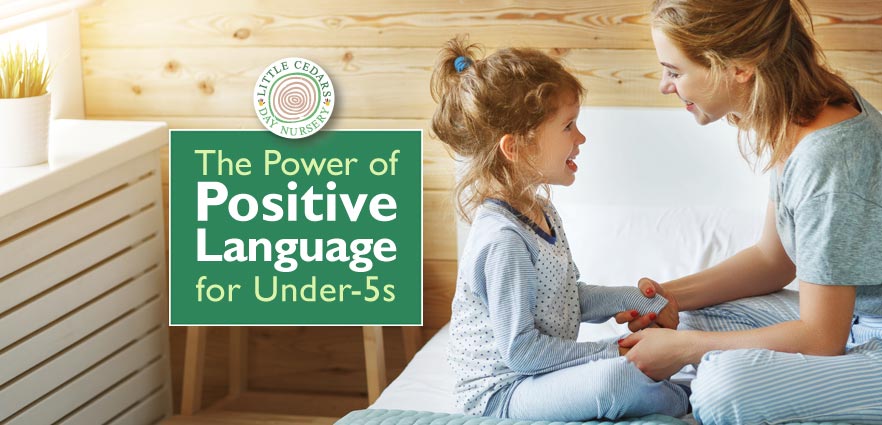
 In today’s post, we explore the benefits of using positive language around under-fives. All too often, it’s tempting to say ‘No!’, ‘Stop that!’ or even ‘Don’t Eat That!’ and similar around little ones. This is particularly true when you want them to cease the offending activity urgently or are simply exhausted if it’s been a challenging day. There are good reasons for such negative commands, of course, not least that of their safety in many cases. However, such commands can sound stern and cause stress for the little ones. What’s more, if a child hears too much negative language and cannot understand why they’re not allowed to do a particular thing, problems can begin to arise and, indeed, the issue can become insidious. It may even result in worsening behaviour. Let’s explore, therefore, the issues around negative language and the simple solution that’s available in the form of positive language.
In today’s post, we explore the benefits of using positive language around under-fives. All too often, it’s tempting to say ‘No!’, ‘Stop that!’ or even ‘Don’t Eat That!’ and similar around little ones. This is particularly true when you want them to cease the offending activity urgently or are simply exhausted if it’s been a challenging day. There are good reasons for such negative commands, of course, not least that of their safety in many cases. However, such commands can sound stern and cause stress for the little ones. What’s more, if a child hears too much negative language and cannot understand why they’re not allowed to do a particular thing, problems can begin to arise and, indeed, the issue can become insidious. It may even result in worsening behaviour. Let’s explore, therefore, the issues around negative language and the simple solution that’s available in the form of positive language.
What’s Wrong With Saying No?
There’s nothing wrong, per se, with telling your child not to do something. More often than not, such a ‘negative’ command is given from the need to protect a child — it’s for their own good. The issue is more about how you say it (we’ll come back to that later).
There’s nothing wrong, per se, with telling your child not to do something. It’s more about how you phrase it.
Once babies have become toddlers, they start to explore their surroundings and want to be into everything. It’s all such an adventure for them! However, while it’s fun for them, it’s our job as parents to protect them, and their peers, from harm. When setting boundaries our maturity and experience tells us when things are dangerous. Toddlers just haven’t got that sense of potential danger, though. They therefore may not understand that we are saying ‘no’ or ‘don’t do that’ for their own good.
 Sometimes, though, constantly hearing ‘no’ can spark tantrums, particularly if a child doesn’t understand the reason they are not allowed to do something. They can feel particularly frustrated when they receive a succession of negative commands and, in the end, may feel they simply can’t do anything right. This can lead not only to stress for them, but also to possible low self-esteem. Furthermore, if they hear ‘no’ and other negative language too often, they can begin to ‘tune out’ to it. They could then go on to develop challenging behaviour due to this, their confusion and frustration. Stress levels can then rise for the parent too, the infant can pick up on this and it can become a real vicious circle. It doesn’t have to be that way, though …
Sometimes, though, constantly hearing ‘no’ can spark tantrums, particularly if a child doesn’t understand the reason they are not allowed to do something. They can feel particularly frustrated when they receive a succession of negative commands and, in the end, may feel they simply can’t do anything right. This can lead not only to stress for them, but also to possible low self-esteem. Furthermore, if they hear ‘no’ and other negative language too often, they can begin to ‘tune out’ to it. They could then go on to develop challenging behaviour due to this, their confusion and frustration. Stress levels can then rise for the parent too, the infant can pick up on this and it can become a real vicious circle. It doesn’t have to be that way, though …
What to Do Instead – Using Positive Language
The best way to counter a negative result from negative language is to try to use positive phrasing (we’ll come to some examples shortly). The words we choose can significantly influence our children’s behaviour and achievements. So, by changing our tone and choice of words, we can show toddlers an alternative action to what they originally intended to do — all achieved in a positive way.
Positive, encouraging words help children to feel happier about situations. Also, by the child choosing a more positive action, it can make them feel empowered. When they follow positive words and requests, it will bring about a sense of achievement for the child. Suddenly, from their perspective, they chose the ‘right’ course of action rather than coming away feeling that they did something wrong. Gradually, the whole environment at home can become calmer and more positive too. What a contrast this is to the negative alternative!
Examples:
Remember to praise them when they have followed your suggestion and made the right choice.
Tips:
- Be clear, with simple explanations.
- Provide alternative options — explain what they can do instead of what they can’t.
- Let them know what behaviour you want to see from them.
- Sometimes use a “yes you can, but later” approach.
- Praise them when you see them choose the better alternative.
Before long, your child will catch on and both parent and child will be be more at ease and each will be happy with the results. Indeed, our childcare professionals at Little Cedars Nursery often use this kind of approach — and it works!
High Quality Childcare in our Streatham Nursery & Pre-School
Give your child the best start in life with childcare from Little Cedars Nursery, Streatham

 Little Cedars offers under-fives a first class early years education in a safe, homely and nurturing environment. We are an excellent nursery and pre-school in Streatham supplying a first class childcare service to families near Streatham Hill, Streatham Park, Streatham Common and Furzedown as well as Tooting, Tooting Bec, Tooting Broadway, Tooting Common, Balham, Norbury and Colliers Wood.
Little Cedars offers under-fives a first class early years education in a safe, homely and nurturing environment. We are an excellent nursery and pre-school in Streatham supplying a first class childcare service to families near Streatham Hill, Streatham Park, Streatham Common and Furzedown as well as Tooting, Tooting Bec, Tooting Broadway, Tooting Common, Balham, Norbury and Colliers Wood.
Please let us know if you’d like to register your baby, toddler or preschooler for a place at the nursery/pre-school. We can show you and your child around, confirm fees, answer any questions and clarify any Government childcare funding options. We’re here to help, so please get in touch:

